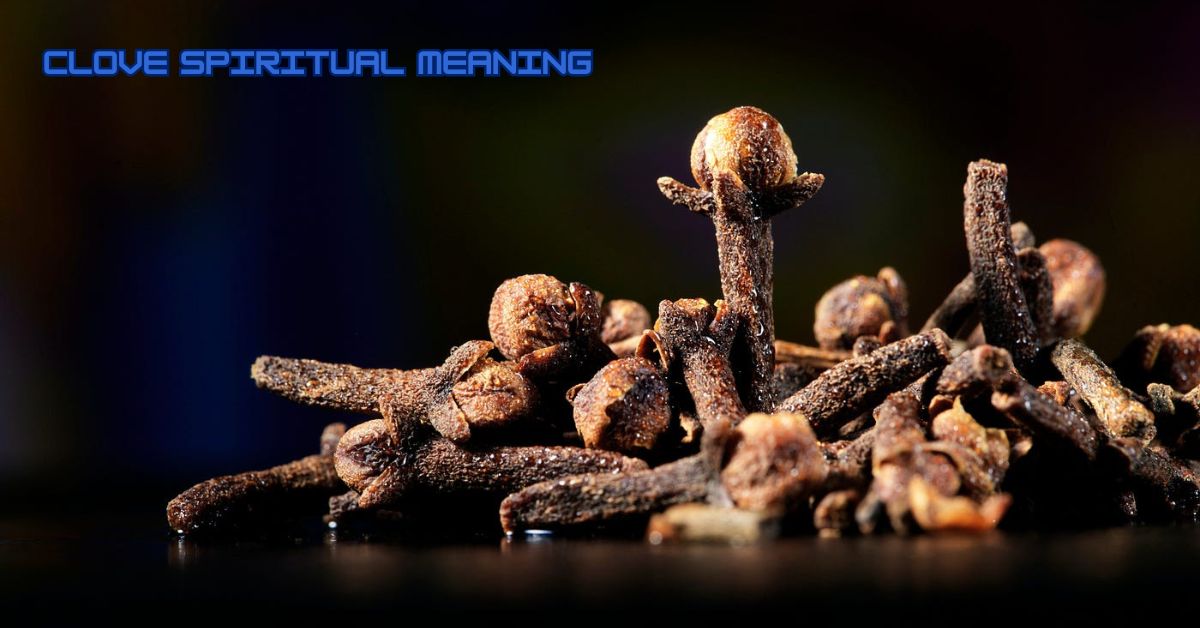Topic
Clove Spiritual Meaning and Symbolism

Clove, scientifically known as Syzygium aromaticum, is not only a popular spice but also holds deep spiritual significance across various cultures and traditions. This article explores the spiritual meanings associated with cloves, their historical significance, and how they are used symbolically in spiritual practices and rituals.
Historical and Cultural Significance
Clove has a rich history dating back centuries, primarily originating from Indonesia but traded extensively throughout Asia, Africa, and Europe. Its potent aroma and medicinal properties made it highly valued in ancient societies, where it was used not only in cooking but also in religious ceremonies, healing practices, and as a symbol of protection.
Spiritual Meanings of Clove
- Protection and Warding Off Negativity:
- Cloves are often believed to have protective qualities against negative energies, malevolent spirits, and psychic attacks. In many cultures, cloves were hung in doorways or scattered around homes to create a barrier against harm.
- Spiritual Cleansing and Purification:
- Burning cloves or using clove oil in aromatherapy is thought to cleanse spaces, purify the aura, and promote spiritual harmony. The smoke from burning cloves is believed to dispel negative energies and invite positive vibrations.
- Enhancing Spiritual Awareness:
- In some spiritual practices, cloves are used to heighten intuition, enhance psychic abilities, and facilitate deeper spiritual connections. Their stimulating fragrance is believed to open the mind and increase spiritual awareness.
Uses of Clove in Spiritual Practices
- Incense and Smudging:
- Cloves are burned as incense or added to smudge sticks during rituals to purify sacred spaces, invoke protection, and promote spiritual clarity.
- Anointing and Blessings:
- Clove oil is used for anointing objects, candles, or individuals during ceremonies to imbue them with protective energies and blessings.
- Meditation and Rituals:
- Placing cloves on altars or using them as focal points during meditation is believed to deepen concentration, promote inner peace, and facilitate spiritual growth.
Symbolism of Clove in Different Cultures
- Chinese Culture:
- In Chinese traditions, cloves symbolize good fortune, prosperity, and protection. They are often included in herbal remedies and spiritual practices to ward off evil and attract blessings.
- Indian Culture:
- In Ayurvedic medicine and Hindu rituals, cloves symbolize purification, healing, and spiritual enlightenment. They are used in religious ceremonies and rituals to invoke divine blessings and cleanse sacred spaces.
- European Folklore:
- In European folklore, cloves were placed in sachets or charms to protect against illness, evil spirits, and misfortune. They were also associated with love, fidelity, and prosperity.
Conclusion: Clove Spiritual Meaning
Clove Spiritual Meaning and symbolic significance across diverse cultures worldwide. Whether used for protection, purification, or enhancing spiritual awareness, cloves continue to play an integral role in spiritual practices and rituals. Their aromatic presence not only enhances the sensory experience but also deepens the connection to spiritual realms and energies.
FAQs
- Can cloves be used for healing purposes in spiritual practices?
- Yes, cloves are believed to have medicinal properties and are used in spiritual practices to promote healing, purification, and overall well-being.
- How can cloves be incorporated into daily spiritual rituals?
- Cloves can be burned as incense, added to bath water for purification, used in meditation practices, or placed on altars to invoke protection and spiritual blessings.
- Are there different types of cloves used in spiritual practices?
- While Syzygium aromaticum is the most common type of clove used, various species of cloves and their oils may be used based on regional traditions and availability.
- Do cloves have any connection to astrology or divination practices?
- In some cultures, cloves are associated with planetary influences and used in astrological rituals or divination practices to enhance spiritual insight and intuition.
- Are there any precautions to consider when using cloves in spiritual rituals?
- It’s essential to use cloves in moderation and be mindful of allergies or sensitivities. Always source high-quality cloves and use them with respect for their spiritual significance and potency.
Topic
Harnessing the Power of Laravel Pipelines

Laravel provides an elegant way to manage complex workflows and processes in an application. Through its built-in features, developers can streamline tasks, making code more maintainable and efficient. One of the most powerful tools in this ecosystem is the Laravel pipeline, a flexible method to manage operations sequentially. Below, we will explore how Laravel pipelines can simplify complex tasks and improve the structure of your code.
Streamlining Application Logic with Laravel Pipelines
Laravel pipelines offer a straightforward approach to handling a series of tasks. Instead of relying on complex conditional statements, the pipeline allows you to chain operations, each performing a discrete action. This improves the readability and maintainability of your codebase, making it easier for developers to debug or modify workflows.
Chaining operations isolates specific parts of your logic, enabling a modular design. With each task encapsulated within its pipeline step, you ensure that future changes to any part of the process don’t require extensive rewrites. This reduces technical debt, allowing developers to focus on other application areas without worrying about breaking existing functionality.
The flexibility of Laravel pipelines also makes them ideal for managing dependencies between tasks. Each step can conditionally pass data along, allowing the next operation to use previously generated information. This seamless flow between tasks ensures a smooth transition from one operation to the next, eliminating unnecessary complexity.
Finally, Laravel pipelines support multiple configurations, making them adaptable to various business logic requirements. Whether you’re building a customer service tool or an e-commerce platform, Laravel pipelines help you stay organized and reduce the likelihood of errors. This approach results in faster development cycles and more reliable software.
Simplifying Complex Processes Using Laravel Pipelines
When handling complex processes, breaking them down into manageable steps is crucial. Laravel pipelines allow you to do this effortlessly by structuring operations in a clear sequence. This decomposition ensures that each individual process focuses on one aspect of the overall workflow, making it easier to troubleshoot and refine as needed.
In scenarios where tasks are interdependent, pipelines provide a natural data flow. By sending the output of one operation directly to the next, you ensure that each step gets the necessary information to continue. This eliminates the need for manual data handling and reduces the potential for errors when passing variables between functions.
Moreover, Laravel pipelines work well for handling actions that require multiple conditions. You can chain operations and let each one decide whether to continue, apply specific logic, or skip over certain steps. This adaptive capability simplifies managing workflows where conditions vary based on external inputs or configuration settings.
Pipelines are also useful in scenarios that require repeated task execution, such as processing large datasets or filtering items. Structuring each action as part of a pipeline allows you to reuse code without repeating the same logic. This approach ensures consistency and optimizes performance by reducing the overhead of redundant operations.
Best Practices for Implementing Laravel Pipelines in Your Project
The key to successfully implementing Laravel pipelines is ensuring that each step is focused and concise. Avoid bundling multiple tasks into a single step, as this can reduce clarity and hinder maintainability. By adhering to the principle of single responsibility, each operation in the pipeline becomes more predictable and easier to test.
One best practice is to keep the pipeline flexible enough to adapt to changes. Design your pipelines to be extensible, allowing additional tasks to be easily added or removed. This flexibility ensures you can scale the pipeline without disrupting its flow or introducing bugs into existing functionality as your application evolves.
It’s important to optimize your pipeline’s performance. While Laravel pipelines are generally efficient, complex or unnecessary steps can introduce performance bottlenecks. Always consider the cost of each operation and focus on minimizing redundant tasks, especially when dealing with large volumes of data or intricate workflows.
Lastly, ensure thorough testing of each pipeline step to guarantee that the overall process functions as intended. Laravel provides excellent testing tools, which you can leverage to validate each operation in isolation. This approach helps detect errors early in development and ensures the pipeline operates smoothly across various scenarios.
Altogether, Laravel pipelines offer a powerful solution for managing complex workflows with simplicity and flexibility, enabling developers to build more efficient and maintainable applications. By implementing best practices, optimizing performance, and ensuring thorough testing, developers can significantly enhance the scalability and reliability of their projects over time.
CLICK HERE FOR MORE BLOG POSTS
Topic
The Top Power Tools Every DIY Enthusiast Should Own

For DIY enthusiasts, having the right tools can transform a hobby into a passion, enabling precise work and professional-quality results on home projects. Among the essentials for any DIY toolkit are power tools, particularly those offered by Powerhousexpress in Pakistan.
In this article, we focus on the indispensable corded power tools that every DIYer should own to tackle a wide range of tasks efficiently and safely.
Essential Corded Power Tools for DIY Projects
- Corded Drill: The cornerstone of any power tool collection, a corded drills offers unmatched reliability and power for drilling through various materials, including wood, metal, and masonry. Powerhousexpress models are known for their durability and robust performance, ensuring that even the toughest drilling jobs are completed with ease.
- Circular Saw: For cutting through wood or other materials with precision and speed, a circular saw is indispensable. It’s ideal for making straight cuts and is a must-have for tasks like trimming doors, cutting shelving, or even tackling larger projects like building a deck.
- Jigsaw: When it comes to making intricate cuts in wood or metal, a jigsaw is your go-to tool. Perfect for cutting curves and complex shapes, it’s essential for tasks such as cutting out sink holes in countertops or crafting custom pieces of furniture.
- Orbital Sander: Achieving a smooth finish on wood projects is effortless with an orbital sander. It’s much faster and more effective than sanding by hand, and it’s ideal for preparing surfaces for painting or staining.
- Reciprocating Saw: Known for its versatility, a reciprocating saw is crucial for demolition projects or for cutting through tough materials like piping, fiberglass, and even tile. Its push-and-pull motion allows for aggressive cutting actions that other saws cannot achieve.
- Bench Grinder: For sharpening tools, grinding down metal parts, or even smoothing rough edges, a bench grinder is a valuable addition to your workshop. It’s also useful for shaping metal and cleaning objects before welding or fitting.
The Advantages of Corded Tools
While cordless tools offer convenience and portability, corded tools win in terms of uninterrupted power and performance. They are generally more powerful and do not require batteries, making them ideal for prolonged use on larger projects where stopping to recharge can disrupt workflow. Additionally, corded tools tend to be more cost-effective over the long term, as they do not require battery replacements.
Powerhousexpress Commitment to Quality
Powerhousexpress in Pakistan ensures that DIY enthusiasts have access to high-quality, reliable corded power tools that can handle a variety of tasks. Their products are engineered to meet the needs of both novice and experienced DIYers, providing performance, safety, and durability.
Tips for Choosing and Using Corded Power Tools
When selecting power tools, consider the specific needs of your projects, the tool’s power requirements, and its ergonomic design to ensure comfortable and safe usage. Always follow the manufacturer’s guidelines for use and safety, and wear appropriate protective gear, such as safety goggles and gloves.
Conclusion
Equipping yourself with the right corded power tools can make a significant difference in the quality and enjoyment of your DIY projects. With tools from Powerhousexpress, DIY enthusiasts in Pakistan can trust that they are using some of the best equipment on the market. Whether you’re a beginner or a seasoned pro, these tools will help you achieve your creative visions with precision and efficiency, making every project a success.
Topic
Key Features of Machine Stretch Film

Machine stretch film is an essential component in modern packaging and logistics operations, particularly for automated systems used in industrial settings. While machine stretch film offers several benefits tailored to high-volume and high-efficiency applications, hand stretch film is also an important option for manual wrapping tasks. Both types of stretch films offer distinct advantages depending on the specific needs of the operation. Machine stretch film, often manufactured by brands like PWP Stretch Film, is designed to deliver superior stretch and consistency for automated wrapping systems. This type of stretch film offers several benefits tailored to high-volume and high-efficiency applications, including the following key features:
High-Quality Stretch and Consistency
Machine stretch film is designed to deliver superior stretch performance and reliability when used with automated wrapping systems. Unlike hand stretch films, machine stretch films are engineered to maintain a high level of elasticity and force, allowing them to stretch further without compromising strength. This enhanced stretchability ensures better load containment and protection, with more efficient use of material. The consistency in performance also minimizes the risk of film breakage or inadequate wrapping, resulting in more stable and secure packaging.
Available in Longer Rolls
Machine stretch film is typically available in longer rolls, often reaching lengths of 5,000 feet or more. These extended rolls are specially designed to fit the automated stretch wrapping machines, enabling them to run for longer periods without requiring frequent film changes. The longer rolls increase productivity by reducing downtime and enhancing operational efficiency, making them ideal for high-volume packaging operations in warehouses, distribution centers, and manufacturing plants.
Material Variants
Machine stretch film comes in a variety of material options to cater to different packaging needs. Some of the most common variants include:
Clear Rolls
Clear machine stretch film is widely used for general-purpose wrapping. The transparent nature of the film allows for easy visibility of the packaged goods, making it easier for warehouse staff to identify contents. Additionally, clear film does not obscure any barcodes or labels on products, helping to streamline inventory management and improve operational flow.
Colored Rolls
Colored stretch film serves multiple purposes, including branding, color-coding, and providing additional protection for certain types of products. For example, colored films can be used to distinguish different product types, making sorting and organizing more efficient in large warehouses or shipping facilities. Additionally, colored films can offer some level of UV protection for products sensitive to light, such as certain chemicals, pharmaceuticals, or food products.
Specialty Films
In addition to the standard options, specialty films are available to meet specific needs or requirements in certain industries. These include films with built-in UV protection, which shield products from harmful sunlight exposure during storage or transportation. Anti-static films are another specialized option, useful in environments where static electricity could damage electronic components or sensitive equipment. Custom films can also be tailored for particular applications, such as for temperature-sensitive items or products requiring extra puncture resistance.
Additionally, VCI stretch film is a specialty variation designed specifically to protect metal products from corrosion during storage or transportation. VCI stretch film contains a corrosion inhibitor that releases vapors, creating a protective layer around the metal to prevent rust and deterioration, making it ideal for industries that handle metal parts or equipment.
Durability and Puncture Resistance
Machine stretch films are engineered to be highly durable, with excellent puncture and tear resistance. This ensures that products remain securely wrapped throughout the supply chain, even under rough handling conditions. The strength of the film is important for protecting products from damage due to impacts, sharp objects, or rough surfaces during transit and storage.
Efficiency and Cost-Effectiveness
The use of machine stretch film reduces the amount of material required for wrapping, as its superior stretch capacity allows for optimal film usage. This results in less waste and lower material costs per pallet, improving the overall cost-effectiveness of packaging operations. Additionally, the speed at which automated wrapping systems can apply the film helps to increase throughput and minimize labor costs.
Environmentally Friendly Options
With increasing emphasis on sustainability, many machine stretch films are now available in eco-friendly versions. These films are often made from recycled materials or designed to be fully recyclable themselves. Companies looking to reduce their environmental footprint can opt for these green alternatives without sacrificing the performance and reliability of the stretch film.

 Cartoon1 year ago
Cartoon1 year agoUnlocking the Potential of Nekopoi.care: A Comprehensive Guide

 Game1 year ago
Game1 year agoExploring Aopickleballthietke.com: Your Ultimate Pickleball Destination

 BUSINESS1 year ago
BUSINESS1 year agoWhat Companies Are In The Consumer Services Field

 HOME IMPROVEMENT1 year ago
HOME IMPROVEMENT1 year agoVtrahe vs. Other Platforms: Which One Reigns Supreme?

 BUSINESS11 months ago
BUSINESS11 months agoUnraveling the Mystery of 405 Howard Street San Francisco charge on Credit Card

 TECHNOLOGY11 months ago
TECHNOLOGY11 months agoThe Guide to Using Anon Vault for Secure Data Storage

 ENTERTAINMENT8 months ago
ENTERTAINMENT8 months agoUnderstanding Bunkr Album: A Comprehensive Guide

 ENTERTAINMENT1 year ago
ENTERTAINMENT1 year agoThe Epic Return: Revenge of the Iron-Blooded Sword Hound
















